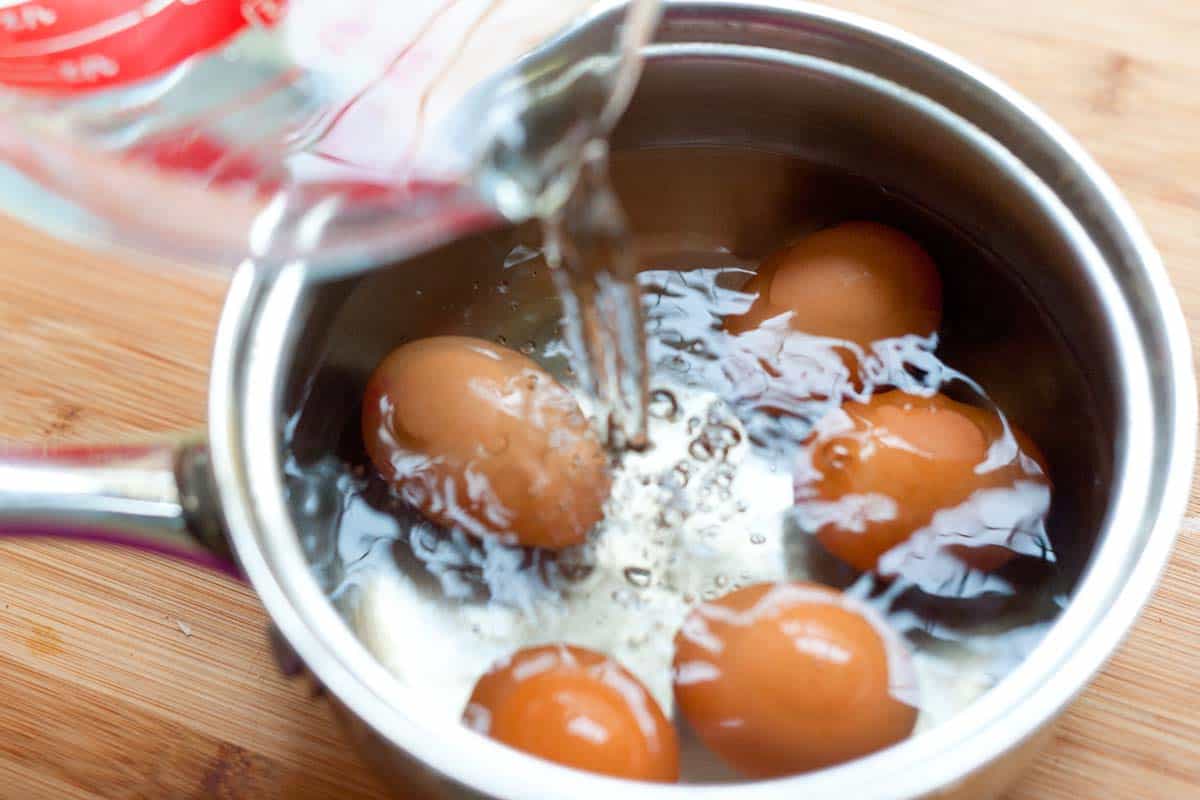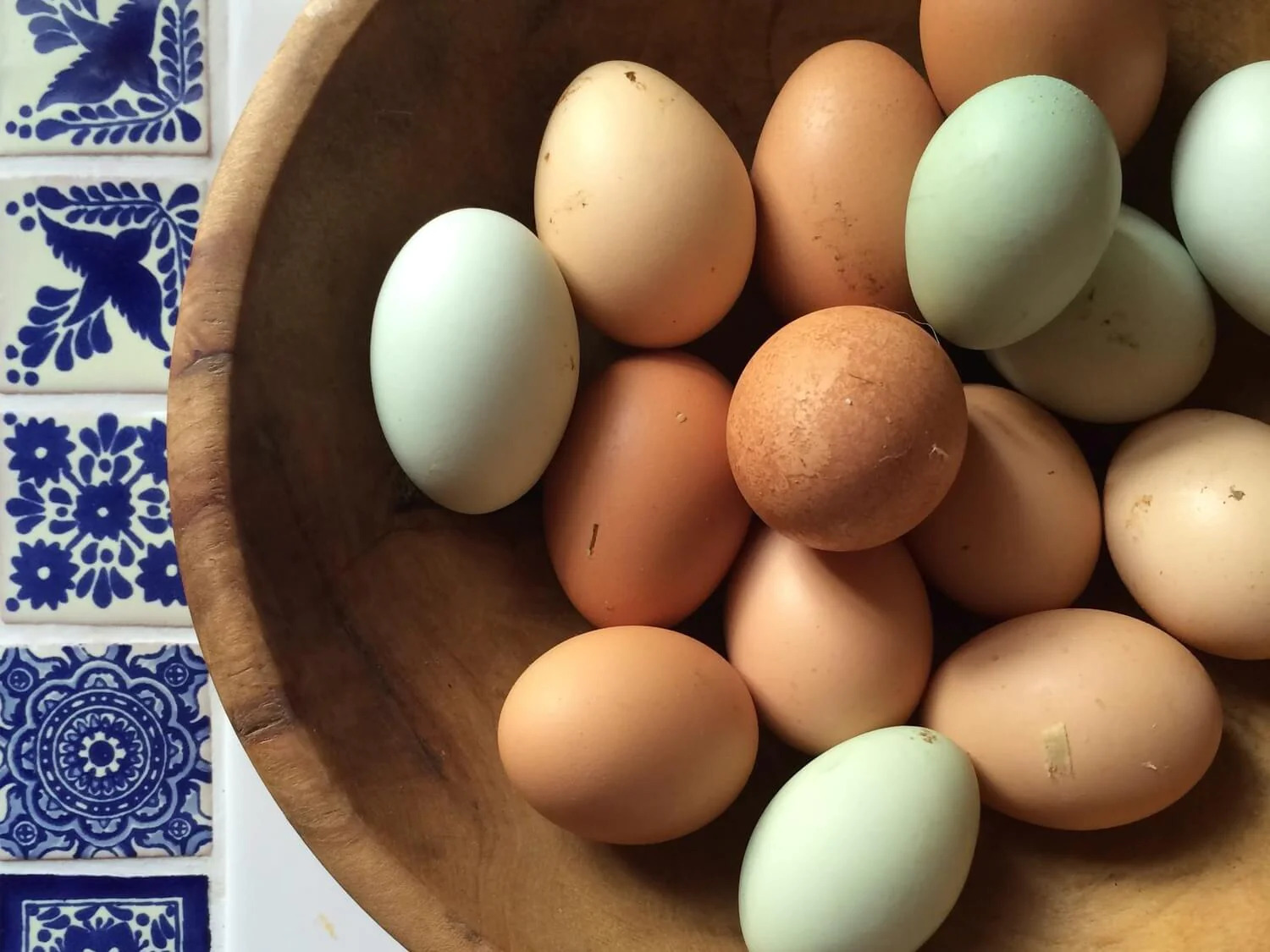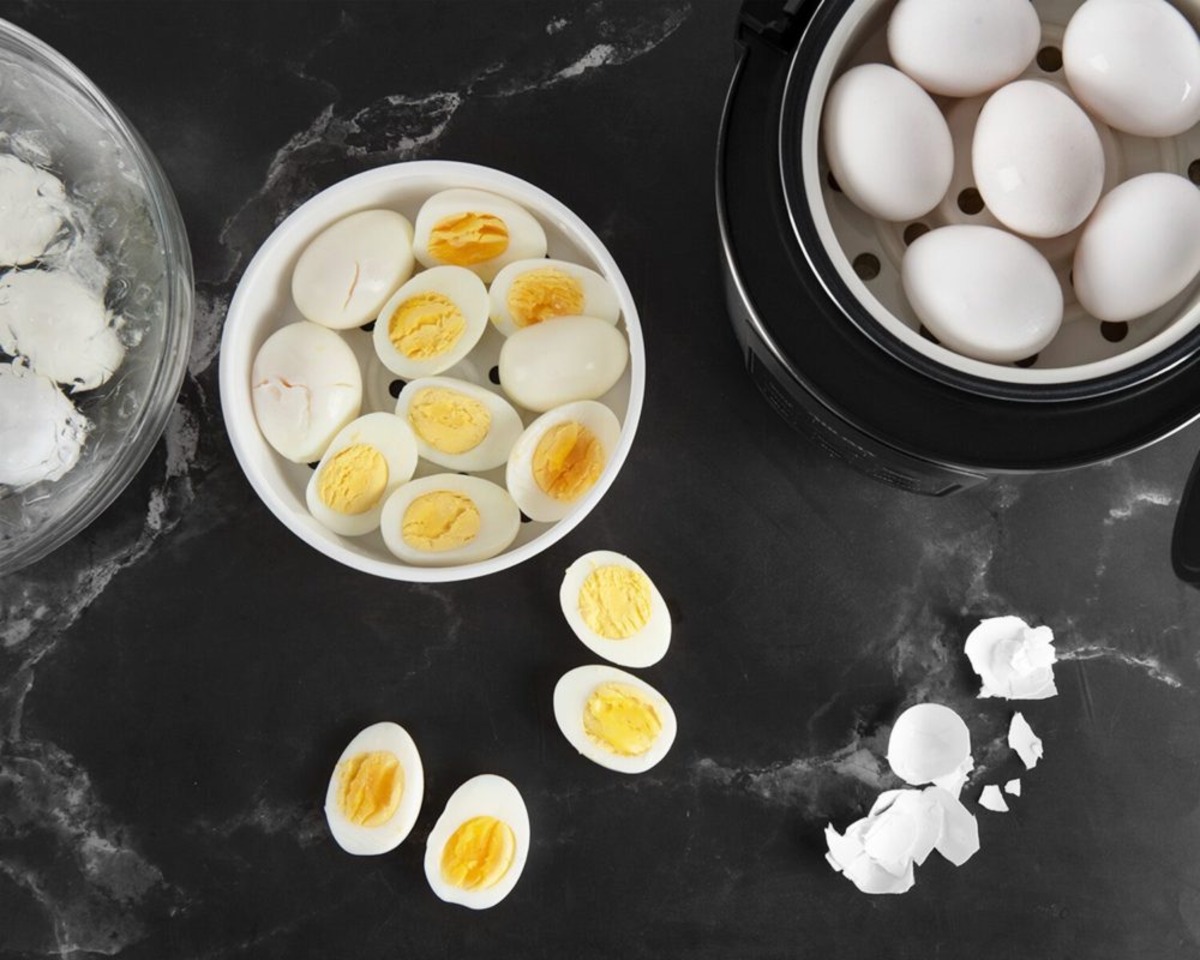Home>Articles>How To Store Boiled Eggs Without Refrigeration


Articles
How To Store Boiled Eggs Without Refrigeration
Modified: February 26, 2024
Learn how to store boiled eggs without refrigeration in this informative article. Discover simple tips and tricks to keep your eggs fresh and safe without the need for a refrigerator.
(Many of the links in this article redirect to a specific reviewed product. Your purchase of these products through affiliate links helps to generate commission for Storables.com, at no extra cost. Learn more)
Introduction
Boiled eggs are a versatile and nutritious food that can be enjoyed in a variety of dishes, from salads to sandwiches. However, their perishable nature often requires refrigeration to prevent spoilage. But what if you find yourself in a situation where refrigeration is not available? Is it possible to store boiled eggs without refrigeration?
In this article, we will explore the various methods and factors to consider when it comes to storing boiled eggs without refrigeration. Whether you’re on a camping trip, traveling, or simply facing a power outage, these tips will help you keep your boiled eggs safe and delicious.
Before we delve into the specifics, it’s important to understand why storing boiled eggs without refrigeration can be challenging. Eggs are highly perishable, and they contain proteins that can support the growth of harmful bacteria when not properly stored at the right temperature. Refrigeration slows down bacterial growth and helps to extend the shelf life of eggs. However, there are alternative methods that can be employed when refrigeration is not an option.
While it may not be ideal, storing boiled eggs without refrigeration is possible if certain factors are taken into consideration. The quality and freshness of the eggs, the cooling process, the storage environment, and proper air circulation all play a role in ensuring the safety and longevity of the eggs. Let’s explore these factors in more detail.
Key Takeaways:
- Storing boiled eggs without refrigeration is possible with proper cooling, storage, and freshness checks. Enjoy the convenience and nutrition of boiled eggs in various situations by following these guidelines.
- Choose fresh, intact eggs, cool them properly, and store in a cool, dry place with adequate air circulation. Protect from sunlight and check for freshness before consuming to ensure safety and quality.
Read more: How To Store Eggs Without Refrigeration
Why Store Boiled Eggs Without Refrigeration?
There are various reasons why you may need to store boiled eggs without access to refrigeration. Perhaps you’re embarking on a hiking or camping trip and want to bring along a protein-packed snack. Maybe you’re traveling and don’t have access to a refrigerator in your accommodation. It could also be that you’re experiencing a power outage and need to find a temporary solution for preserving your boiled eggs. Whatever the reason, understanding the importance of properly storing boiled eggs without refrigeration can help ensure their safety and prevent foodborne illnesses.
One of the primary reasons people choose to store boiled eggs without refrigeration is for convenient on-the-go snacking. Boiled eggs are a great source of energy and protein, making them an ideal choice for athletes, hikers, and travelers. By having a supply of boiled eggs on hand that don’t require refrigeration, you can enjoy a nutritious and filling snack whenever and wherever you need it.
Additionally, storing boiled eggs without refrigeration can be a necessity during emergency situations such as power outages or natural disasters. When electricity is unavailable, refrigeration becomes impossible, but having a backup plan for preserving food, including boiled eggs, can be crucial for survival and sustained nutrition.
Another reason to consider storing boiled eggs without refrigeration is for those who live in areas where electricity is unreliable or not readily available. In such cases, having alternative storage methods for food, including boiled eggs, can be a practical and necessary approach.
It’s important to note that while storing boiled eggs without refrigeration is possible, it does come with some risks. The lack of refrigeration can accelerate bacterial growth, leading to potential foodborne illnesses. Therefore, it’s vital to follow proper techniques and consider certain factors to mitigate these risks and ensure the safety of the stored boiled eggs.
Now that we understand why storing boiled eggs without refrigeration is necessary in certain situations, let’s explore the important factors to consider when implementing this storage method.
Factors to Consider
When it comes to storing boiled eggs without refrigeration, there are several factors that need to be considered to ensure their safety and quality. These factors include the quality of the eggs, the cooling process, the storage environment, air circulation, protection from sunlight, and checking for freshness before consumption.
Quality of the Eggs:
Choosing the right eggs is crucial for successful storage without refrigeration. Select eggs that are fresh and have intact shells. Avoid using eggs with cracks, as they can pose a higher risk of bacterial contamination. Fresh eggs will last longer and have a lower risk of spoilage, even without refrigeration.
Cooling Process:
Properly cooling boiled eggs is essential to prevent bacterial growth. After boiling, immerse the eggs in an ice bath or run them under cold water for a few minutes until they have cooled down completely. This rapid cooling will help to halt the cooking process and lower the temperature of the eggs, reducing the risk of bacterial growth.
Read more: How To Store Hard-Boiled Eggs
Storage Environment:
The storage environment plays a significant role in preserving the boiled eggs. Choose a cool and dry place for storing the eggs, away from direct sunlight and heat sources. Avoid storing them near strong-smelling foods, as eggs can absorb odors easily. A temperature range of 50-70°F (10-20°C) is considered suitable for storing boiled eggs without refrigeration.
Air Circulation:
Proper air circulation is important for preventing moisture buildup, which can lead to mold growth and spoilage. Ensure there is adequate ventilation in the storage area, allowing for the exchange of air. If storing in containers, use perforated or breathable packaging to maintain air circulation around the eggs.
Protection from Sunlight:
Exposure to sunlight can accelerate the spoilage process and affect the quality of the boiled eggs. Keep the eggs in a dark or opaque container to protect them from sunlight. Consider wrapping them in clean cloth or storing them in an egg carton to shield them from light exposure.
Check for Freshness:
Before consuming stored boiled eggs, it’s important to check for freshness. While refrigeration helps to extend the shelf life of boiled eggs, those stored without refrigeration may have a shorter lifespan. Conduct a visual inspection to ensure there are no signs of spoilage, such as an off odor, discoloration, or unusual texture. If any doubts exist about the safety and freshness of the eggs, it’s best to discard them.
By considering these factors and implementing the appropriate techniques, you can successfully store boiled eggs without refrigeration. Properly stored eggs can remain safe and enjoyable to consume for a reasonable period of time, even without the use of refrigeration.
Now, let’s take a closer look at each of these factors and discuss in more detail how to store boiled eggs without refrigeration.
Choose the Right Eggs
When it comes to storing boiled eggs without refrigeration, selecting the right eggs is the first step towards ensuring their quality and safety. Here are some tips to help you choose the right eggs:
Freshness:
Opt for fresh eggs as they have a longer shelf life and are less likely to spoil quickly. Fresh eggs can be identified by their firm whites, plump yolks, and thick shells. You can check the freshness of an egg by submerging it in a bowl of water – if it sinks and lies flat on its side, it is fresh. If it tilts or floats, it may not be as fresh.
Intact Shells:
Inspect the shells of the eggs and choose ones that are free from cracks, holes, or damages. Eggs with cracks are more susceptible to bacterial contamination, which can lead to spoilage and foodborne illnesses. Cracks in the shell can allow bacteria to enter and multiply, reducing the shelf life of the eggs.
Buy from Reliable Sources:
Purchase eggs from reputable sources such as grocery stores or local farmers’ markets. These sources often follow proper storage and handling practices, ensuring the freshness and quality of the eggs. Eggs that have been stored incorrectly or for extended periods of time are more likely to spoil quickly.
Read more: How To Store Soft Boiled Eggs
Consider Organic or Pasture-Raised Eggs:
Organic or pasture-raised eggs tend to have higher quality and nutritional value compared to conventional eggs. These eggs come from hens that have been raised on organic feed or have access to outdoor areas where they can forage freely. The natural diet and lifestyle of the hens contribute to the superior taste and quality of the eggs.
Choosing the right eggs is essential for successful storage without refrigeration. Fresh, intact, and high-quality eggs will have a better chance of lasting longer and maintaining their flavor and texture. By paying attention to these factors, you can ensure a more enjoyable and safe experience when storing boiled eggs without refrigeration.
Next, we’ll explore the proper cooling process for boiled eggs to minimize the risk of bacterial growth and maximize their storage life.
Cool the Eggs Properly
Properly cooling boiled eggs is a crucial step in storing them without refrigeration. The cooling process helps to halt the cooking process, lower the temperature of the eggs, and minimize the risk of bacterial growth. Here are some tips for cooling boiled eggs properly:
Ice Bath Method:
One of the most effective ways to cool boiled eggs is by placing them in an ice bath. Fill a bowl with cold water and ice cubes. Using a slotted spoon or tongs, carefully transfer the boiled eggs from the pot of boiling water into the ice bath. Let the eggs sit in the ice bath for at least 5 minutes, or until they have cooled down completely. The cold water and ice will rapidly lower the temperature of the eggs, halting the cooking process and minimizing the risk of bacterial growth.
Cold Water Rinse:
If you don’t have access to an ice bath, you can cool the boiled eggs by rinsing them under cold running water. Place the boiled eggs in a colander or strainer and run cold water over them for several minutes. Gently rotate the eggs to ensure that all sides are evenly cooled. Continue rinsing until the eggs are completely cooled.
Read more: How To Store Hard Boiled Eggs In Shell
Avoid Air Drying:
Avoid air drying the boiled eggs after cooking, as this can lead to moisture loss and promote bacterial growth. It’s best to transfer them directly to the cooling method, such as an ice bath or cold water rinse, to maintain their moisture content and ensure their safety during storage.
Use a Ventilated Container:
Once the eggs have been properly cooled, transfer them to a container with good ventilation. Avoid using airtight containers, as this can trap moisture and increase the chances of mold or bacterial growth. Instead, opt for a container with small holes or slits to allow air circulation while still protecting the eggs.
By following these steps and properly cooling the boiled eggs, you can reduce the risk of bacterial growth and ensure their safety during storage without refrigeration. The next step is to find the right storage environment for the eggs.
Store Eggs in a Cool, Dry Place
After properly cooling boiled eggs, the next step is to store them in a suitable environment. Choosing the right storage location is crucial for maintaining the quality and safety of the eggs. Here are some tips for storing boiled eggs in a cool, dry place:
Avoid Room Temperature Storage:
While it is called “room temperature,” this does not mean it is the ideal temperature for storing boiled eggs. Room temperature can vary and may not provide the cool environment necessary to keep the eggs fresh. It’s best to find a cooler spot in your home or storage area.
Read more: How To Store Shelled Hard Boiled Eggs
Temperature Range:
Choose a location with a temperature range of 50-70°F (10-20°C). This range will help slow down bacterial growth and prolong the shelf life of the boiled eggs. Avoid areas that are too warm, such as near ovens or heating sources, as higher temperatures can hasten spoilage.
Dry Environment:
Avoid storing boiled eggs in a humid or damp environment, as excess moisture can promote the growth of mold and bacteria. Choose a dry storage area, such as a pantry or cupboard, where the eggs will be protected from moisture and humidity.
Away from Strong Odors:
Keep boiled eggs away from strong-smelling foods, as they can absorb odors easily. Strong odors can penetrate the shells and affect the flavor and aroma of the eggs. It’s best to store them in a separate container or away from pungent foods in order to maintain their freshness.
Elevated Storage:
Consider elevating the boiled eggs off the storage surface. This helps to improve air circulation and prevent moisture buildup, reducing the chances of mold or bacterial growth. Place the eggs on a wire rack or use an egg holder that allows for proper ventilation and circulation.
Read more: How To Store Hard Boiled Eggs Peeled
Label and Date:
If you have multiple batches of boiled eggs stored, it’s a good practice to label and date the containers. This will help you keep track of their freshness and ensure you consume the oldest eggs first, maximizing their storage life.
By storing boiled eggs in a cool, dry place, you can extend their shelf life and maintain their quality without the need for refrigeration. However, it’s important to ensure proper air circulation in the storage area to prevent moisture buildup and check the eggs for freshness before consumption.
Now that we’ve discussed the importance of a cool and dry storage environment, let’s explore the significance of proper air circulation for storing boiled eggs without refrigeration.
Maintain Proper Air Circulation
Proper air circulation is a crucial factor when it comes to storing boiled eggs without refrigeration. Adequate airflow helps prevent the buildup of moisture, minimize the risk of mold growth, and maintain the freshness of the eggs. Here are some tips to ensure proper air circulation:
Choose Breathable Containers:
When storing boiled eggs, opt for containers that allow air to circulate around the eggs. Wire baskets, egg holders, or perforated containers are excellent choices as they provide ventilation and prevent moisture accumulation. Avoid airtight containers or plastic bags that can trap moisture and lead to bacterial growth.
Avoid Stacking Eggs:
When storing the boiled eggs, avoid stacking them on top of each other. Stacking can restrict air movement and create areas of trapped moisture, increasing the chances of spoilage. Instead, arrange the eggs in a single layer or use an egg holder that can keep them separate while still allowing air to circulate.
Read more: How To Store Peeled Hard Boiled Eggs
Space Out the Eggs:
Give each boiled egg enough space to ensure proper airflow. Avoid overcrowding the storage container, as this can trap moisture and increase the risk of contamination. Leave some room between the eggs to allow air to circulate freely and maintain optimal conditions for storage.
Keep the Storage Area Clean:
Regularly clean and maintain the storage area to prevent the accumulation of dust, dirt, and contaminants. Dust particles can hinder proper air circulation and contribute to the degradation and spoilage of boiled eggs. Wipe down the storage area and containers periodically to ensure a clean and sanitary environment for the eggs.
Choose a Well-Ventilated Storage Location:
Select a storage location that provides adequate ventilation. Avoid storing boiled eggs in enclosed spaces or areas with stagnant air. Instead, opt for well-ventilated areas with good air circulation, such as a pantry shelf or a countertop that is not obstructed by other objects.
Regularly Rotate the Eggs:
To ensure equal exposure to air circulation, periodically rotate the boiled eggs in their storage container. This simple practice helps prevent any moisture buildup or stagnant air and promotes a uniform distribution of airflow around the eggs.
By maintaining proper air circulation during the storage of boiled eggs without refrigeration, you can minimize the risk of moisture buildup, mold growth, and bacterial contamination. A well-ventilated environment ensures that the eggs stay fresh and safe for an extended period of time.
Next, let’s discuss the importance of protecting boiled eggs from sunlight during storage to maintain their quality and flavor.
Protect Eggs from Sunlight
When storing boiled eggs without refrigeration, it’s important to protect them from direct sunlight. Exposure to sunlight can lead to temperature fluctuations, accelerate spoilage, and affect the quality of the eggs. Here are some tips for protecting boiled eggs from sunlight during storage:
Choose an Opaque Container:
Store boiled eggs in an opaque container to shield them from direct sunlight. Clear containers or transparent bags can allow sunlight to penetrate and reach the eggs, which can lead to temperature fluctuations and speed up the spoilage process. Opt for containers made of materials such as plastic, ceramic, or metal that block out sunlight.
Wrap in a Clean Cloth:
If you don’t have an opaque container, you can individually wrap each boiled egg in a clean cloth or paper towel to protect them from sunlight. This additional layer of insulation helps to keep the eggs cool and shielded from direct sunlight exposure during storage.
Store in a Dark Location:
Choose a storage location away from windows or other sources of direct sunlight. Sunlight can increase the temperature inside the storage area, which can lead to spoilage and affect the quality of the eggs. A dark pantry or cupboard is an ideal place for storing boiled eggs without refrigeration.
Read more: How To Boil Eggs In An Electric Skillet
Avoid Temperature Fluctuations:
Fluctuating temperatures caused by exposure to sunlight can negatively impact the freshness and texture of the boiled eggs. Avoid placing them near heat sources or areas that experience frequent temperature changes, such as near an oven or stove. A stable and consistent temperature helps maintain the quality of the eggs during storage.
Check for Discoloration:
Regularly inspect the boiled eggs for any signs of discoloration. If eggs start to develop dark spots or unusual colors, it could be an indication of sun damage. Discard any eggs that show signs of discoloration, as they may have been compromised and could pose a risk to your health.
Read more: How To Store Hard Boiled Eggs Peeled
Label and Date:
Labeling and dating your stored boiled eggs can help you keep track of their freshness. By knowing when they were stored, you can consume the oldest eggs first, ensuring they are enjoyed at their best quality. This practice helps you to avoid keeping boiled eggs beyond their safe storage period.
By protecting boiled eggs from direct sunlight during storage, you can maintain their quality, flavor, and overall freshness. Shielding them from sunlight helps to extend their shelf life and ensures a more enjoyable eating experience when it’s time to consume them.
Now, let’s move on to the importance of checking for freshness before consuming stored boiled eggs without refrigeration.
Check for Freshness Before Consumption
Before consuming stored boiled eggs without refrigeration, it’s crucial to check for freshness to ensure their safety and quality. While proper storage techniques can extend the shelf life of boiled eggs, it’s essential to assess their freshness before consuming them. Here are some tips for checking the freshness of boiled eggs:
Read more: How To Store Deviled Eggs In Refrigerator
Visual Inspection:
Visually inspect the boiled eggs before consuming them. Look for any signs of spoilage, such as discoloration, mold growth, or an off odor. If the eggs appear discolored, greenish, or have an unpleasant smell, it’s best to discard them as it indicates spoilage.
Taste and Smell Test:
If the boiled eggs pass the visual inspection, you can further assess their freshness by conducting a taste and smell test. While the smell of boiled eggs is natural, any unusual or foul odors could indicate spoilage. Similarly, if the boiled eggs have an off taste or a rancid flavor, it’s best to avoid consuming them.
Egg Shell Appearance:
Inspect the egg shells for any cracks, holes, or damages. Eggs with visible cracks are more susceptible to bacterial contamination, and consuming them poses a higher risk of foodborne illness. It’s best to discard eggs with cracked shells, even if they appear visually fine otherwise.
Slime or Stickiness:
Touch the boiled eggs and check for any sliminess or stickiness on the shell. A slimy or sticky residue could indicate bacterial growth or spoilage. If the boiled eggs feel slimy or sticky, it’s best to discard them to avoid any potential health risks.
Read more: How To Boil Eggs In An Electric Kettle
Floating Test:
As a final check, if you have any doubts about the freshness of boiled eggs, you can perform a floating test. Fill a bowl with water and gently place the boiled eggs in it. Fresh eggs will sink to the bottom and lie flat on their sides. Eggs that float or tilt upright may indicate that they are no longer fresh and should be discarded.
By conducting these checks and ensuring the freshness of the boiled eggs, you can enjoy them safely and without worries. If any doubts remain about the safety or freshness of the eggs, it’s best to err on the side of caution and discard them.
Now that we’ve covered the importance of checking for freshness, let’s summarize the key points we’ve discussed in this article.
Conclusion
Storing boiled eggs without refrigeration is possible with proper techniques and considerations. When refrigeration is not available, it’s important to select fresh eggs with intact shells and cool them properly to prevent bacterial growth. Storing boiled eggs in a cool, dry place that offers proper air circulation and protection from sunlight is essential. Regularly checking for freshness before consumption ensures the quality and safety of the eggs.
By following the tips provided in this article, you can store boiled eggs without refrigeration in various situations. Whether you’re on a camping trip, traveling, or experiencing a power outage, these strategies will help you maintain the freshness and safety of boiled eggs for more extended periods.
Remember to choose the right eggs by assessing their freshness and integrity. Properly cool the boiled eggs using methods such as the ice bath or cold water rinse. Store the eggs in a cool and dry environment with sufficient air circulation, protecting them from direct sunlight. Regularly inspect the eggs for any signs of spoilage or discoloration. Finally, conduct taste and smell tests before consuming boiled eggs to ensure their freshness.
While storing boiled eggs without refrigeration has its limitations and risks, with careful attention to these factors, you can enjoy the convenience and nutritional benefits of boiled eggs even in situations where refrigeration is not available.
Remember to prioritize your health and safety when consuming stored boiled eggs, and if in doubt, it is always best to discard eggs that appear spoiled or have an off odor.
So, don’t let the lack of refrigeration stop you from enjoying boiled eggs. Follow these guidelines, select the right eggs, and store them properly to savor the deliciousness even in non-refrigerated environments.
Frequently Asked Questions about How To Store Boiled Eggs Without Refrigeration
Was this page helpful?
At Storables.com, we guarantee accurate and reliable information. Our content, validated by Expert Board Contributors, is crafted following stringent Editorial Policies. We're committed to providing you with well-researched, expert-backed insights for all your informational needs.





0 thoughts on “How To Store Boiled Eggs Without Refrigeration”